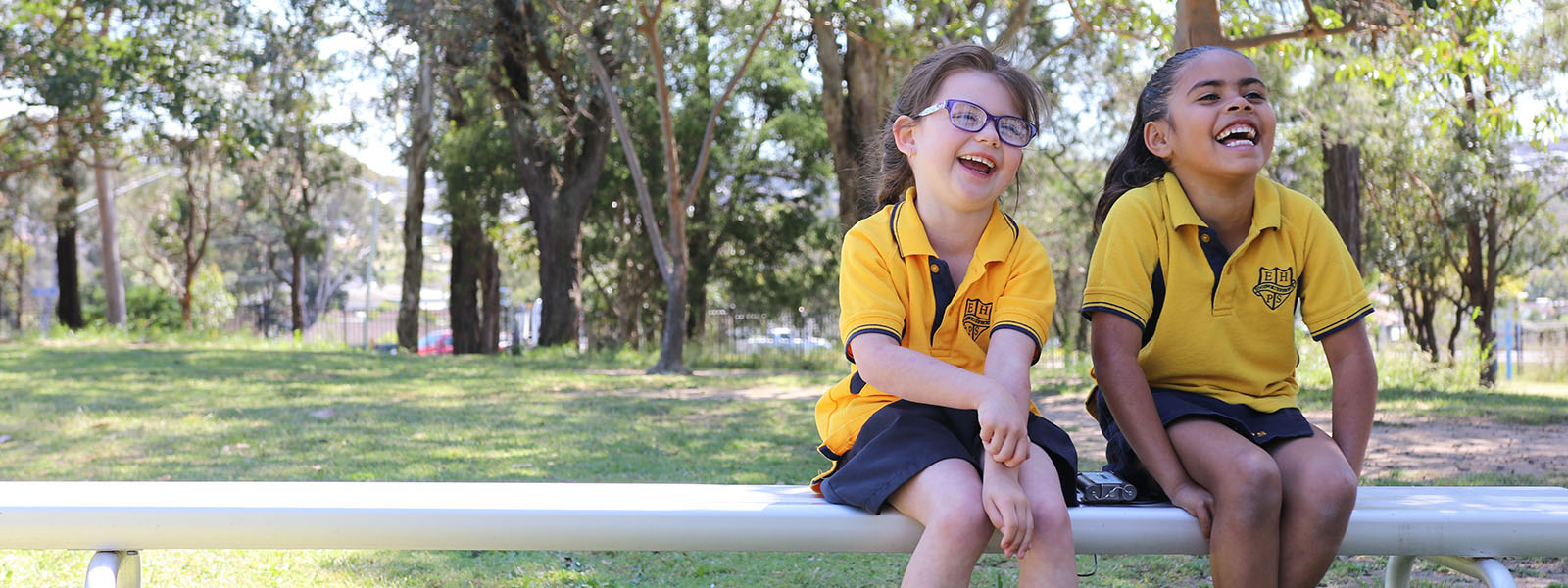Walking through the main gates of Edgeworth Heights Primary School, the sound of little singing voices carries sweetly through the air. Four rows of bright, eager kindergarten faces tinged pink with effort and deep concentration belt out I Can Sing a Rainbow – complete with Auslan signing – as their teachers and two student Occupational Therapists watch on with pride.
"We’re pretending to be her family so she doesn’t get lonely. It makes us happy."
The performance marks the culmination of months of pen-pal correspondence between the Edgeworth kindy class and Calvary aged care residents, who have developed a unique bond via letter-writing as COVID-19 thrust communities into isolation across the globe.
The recorded performance is the first time the aged care residents will lay eyes on their tiny pen-pals, with whom they’ve shared written tales of their families, likes, dislikes, thoughts and feelings throughout the pandemic.
Once the singing comes to an end and the last few voices rush to catch up before trailing off, six-year-old Acacia and five-year-old Holly run breathless over to a laptop where they take a seat and eagerly wait for a moment they’ve been anticipating for months – meeting their pen pal Margaret virtually for the very first time.
We're pretending to be her family so she doesn’t get lonely. It makes us happy," says Acacia.

Margaret Wigney with Acacia's art

Margaret Wigney with Dr Kylie Wales

Margaret meets penpals Acacia and Holly via Zoom

Acacia and Holly talk to Margaret at the computer
On the other end of the screen sits 80-something-year-old Margaret in her Belmont independent living unit. Her face lights up at the sight of the two girls, who she instantly identifies as she holds up the school pictures crafted into colourful rainbows that the girls have sent her.
“Let me guess… there’s Holly and you’re Acacia?,” Margaret asks playfully before the three launch into an enthusiastic conversation about their school, friends and the important Woolworths ‘Ooshies’ that they’re all currently collecting.
Next to Margaret for support during this animated meeting sits University OT lecturer and the brains behind the initiative, Dr Kylie Wales. This moment is as significant for her as it is for Margaret, Acacia and Holly. Their connection is the very thing she’s been working hard behind the scenes to achieve.
"As the world raced to lock down in response to COVID, the detrimental impact on school-aged children and those in aged care facilities became abundantly clear to us,” Dr Wales explains.
"As the world raced to lock down in response to COVID, the detrimental impact on school-aged children and those in aged care facilities became abundantly clear to us."
“We know that social isolation promotes dementia, lethargy and an array of other adverse health issues in older people. Home-schooling was also proving a challenge for young people learning without interaction with teachers and other students.”
Harnessing the University’s unique position in the local community, Dr Wales and her team saw the opportunity for this mutually beneficial intergenerational program.
“With any unprecedented disruption, communities begin looking to their civic leaders for advice and guidance. That’s the role we felt we could play for our partners,” she says.
“As we offer occupational therapy clinics at both primary schools and Calvary aged care facilities locally, we knew the opportunity to connect the two cohorts during isolation was a great way to use our position to support our community.”
Pen pal letters

Letter from Lachlan to his penpal Barry

Letter from Billy to his penpal Val

Letter from Oliver to penpal Arthur
In occupational therapy, ‘occupations’ refer to the everyday activities undertaken as part of daily life.
“The occupations identified for the school children were reading, writing and spelling. For the aged care residents, it was recall and cognitive function. Letter writing was the perfect way to facilitate these tasks, especially from the confines of lockdown,” Dr Wales explains.
Back at Edgeworth Heights Public School, classroom teacher Vanessa Armstrong smiles as Acacia and Holly say a fervent goodbye to Margaret – signing off that she should ‘come and visit from the nursery home once COVID is over’.
“The result has a been a beautiful connection and intergenerational learning between the kindergarteners and their elderly pen pals,” Ms Armstrong says.
“Some of the kids don’t have grandparents or older members of their family to talk to, so the intergenerational learning element has been priceless for them. They tell stories to one another and discuss their likes and dislikes.
“We’ve seen some really lovely friendships form over the past months.
"I’ve watched the kids not only upskill in their academic skills, but also develop their social understanding and compassion.
"I’ve watched the kids not only upskill in their academic skills, but also develop their social understanding and compassion."
“We’re so thrilled that our connection with the University of Newcastle provided us with the chance to take part in this unique program. It’s been a joy for the pen-pals, but also reassuring for us that our kids are still reaching milestones during such a difficult time,” Ms Armstrong says.

"Some of the kids don’t have grandparents or older members of their family to talk to, so the intergenerational learning element has been priceless for them."


